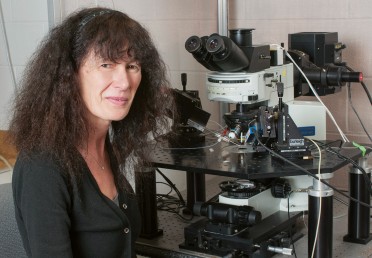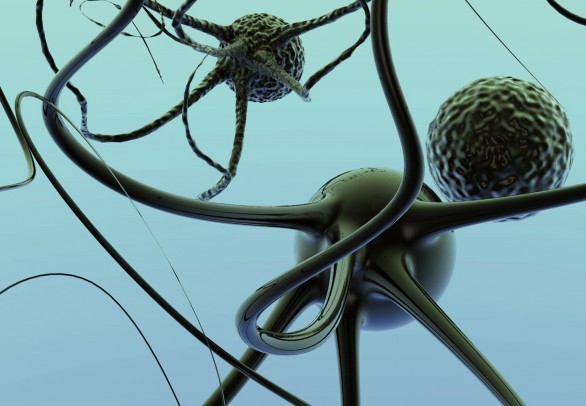At the corner of science and philosophy
By Micki Leventhal
AtLAS magazine
At the intersection of philosophy and biology, chemistry and psychology, the theoretical and the material, lies the Laboratory of Integrative Neuroscience.
Based in the College of Liberal Arts and Sciences, the group is research home to 21 faculty members, as well as collaborators in other colleges.
“Neuroscience represents one of the frontiers of science, in which there is an interface among disciplines providing fertile territory for discovery and advancing knowledge,” said Michael Ragozzino, former director, now head of psychology.
The program, founded in 1998 by then-dean Sidney Simpson, offers the first undergraduate degree in neuroscience in Illinois. Its Ph.D. students can earn an interdepartmental concentration or one of a dozen department-based doctorates in neuroscience.
The group also works with high school students, organizing and coaching a team for the Brain Bee, a city, state, national and international competition of knowledge in neuroscience.
“We are more than the sum of our parts,” said Janet Richmond, current director and professor of biological sciences.
“We all have different disciplines and we are all interacting, in much the same way as the complex nervous system, which is essentially a vast network of communication pathways and systems.”

Janet Richmond, director of the Laboratory of Integrative Neuroscience. Photo: Joshua Clark/UIC Photo Services
Richmond works on the genetic and molecular level, researching the mechanisms of synaptic transmission — communication between neurons — in the brain of the C. elegans worm. She and her graduate student researchers track changes in the neuronal signaling processes, research that will shed light on learning and memory.
“We’ve discovered a scaffold of proteins that interact and are important for getting the receptors in the right place, a superfamily that no one has studied before,” she said. “No one knows their function in humans yet, but we have an inkling from a lowly worm that they are going to be really important.”
David Featherstone, associate professor of biological sciences, is co-director of undergraduate studies for the neuroscience major.
He studies fruit flies and mice to understand the role of glutamate receptors, which determine the route and strength of information flow in the brain.
Research by graduate student Liz Langer, who works in Featherstone’s lab, is an example of the program’s collaborative nature.
Langer is studying how a specific protein alters the chemical environment in the brain, which then alters behavior, Featherstone said.
“That covers the entire range from the molecular up to the behavioral level. To really see, to really understand what’s going on at all levels, we need expertise from chemistry and psychology,” he explained.
“At one point in the project we wondered if the mice were behaving in a certain way because they were feeling anxious,” Featherstone added.
“But what does anxiety actually mean and can we even apply the term ‘anxiety’ to mice? That is exactly the kind of thing that philosophers think about and can help us understand.”
Philosophy professor David Hilbert said philosophers are interested in neuroscience because “it can be really quite valuable to gain understanding of how we work normally.”
“It needn’t always be people who have something wrong with them who are helped by neuroscience,” said Hilbert, whose interests include vision and color perception.

Philosophy professor David Hilbert: “Not just science, but life itself, is fundamentally interdisciplinary.” Photo: Joshua Clark/UIC Photo Services
“Achieving a more integrated picture of how the brain works and generates behavior may lead us to new and better ways of thinking about ourselves that can make us happier and more effective people.”
Neuroscience offers psychologists another way to understand behavior, said Mitchell Roitman, associate professor of psychology and the program’s associate director.
“Historically we’ve thought of the nervous system as having developed from some blueprint, but in fact it is incredibly plastic and responsive to the environment in which we develop and the environment we are bathed in as adults,” he said.
“It’s a two-way street. The structure and function of the brain generates behavior, and the environment and the things we do flow back down and further influence the chemistry and structure of the brain.”
Jason Jacoby, a Ph.D. candidate doing research in retinal physiology with Robert Paul Malchow, associate professor of biological science, says he “finally found his passion” in the study of neuroscience.
“It is a field that is rapidly evolving on a daily basis both in terms of scientific discovery and garnering the attention of federal funding agencies,” said Jacoby, who will be a post-doctoral researcher in ophthalmology at Northwestern University.
Research in the Laboratory of Integrative Neuroscience could lead to treatments and interventions for conditions as far-ranging as epilepsy, Tourette syndrome, obsessive-compulsive disorder and migraine.
Some of the group’s scientists are solving problems in the areas of cognition, decision making, impulsivity, motivation and reward, the mind-body problem and ethics.
Learning how our brains work can help answer some of the “most fascinating questions in the history of humankind: how we construct our personal identities, why we see the world in our own particular way, what makes us do the things we do, and why we remember the smell of our grandmother’s kitchen,” Featherstone said.
“Not just science, but life itself, is fundamentally interdisciplinary,” Hilbert said.
— AtLAS magazine, College of Liberal Arts and Sciences
Categories
Topics

